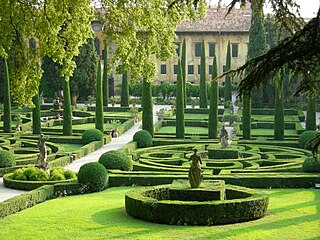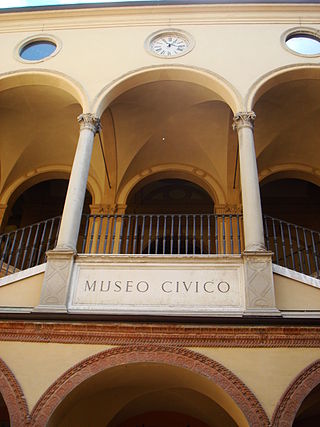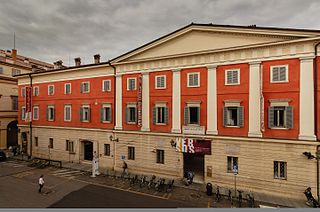This article needs additional citations for verification .(November 2024) |

The Giardini Margherita is a park in Bologna, Italy, located just south of the city centre. [1]
This article needs additional citations for verification .(November 2024) |

The Giardini Margherita is a park in Bologna, Italy, located just south of the city centre. [1]
The park has been opened on 6 July 1879 by the city who bought the land that was part of an ancient Convent. The project made by Ernesto Baldo Bertone di Sambuy is a typical English landscape garden, similar to Parco Sempione in Milan. [2]
In the main square of the park there is a liberty building, used for many years as an astronomical observatory. The use is now made almost impossible by light pollution. Remarkable Santa Maria della Misericordia, Bologna, a church.

The Tyrrhenian Sea is part of the Mediterranean Sea off the western coast of Italy. It is named for the Tyrrhenian people identified with the Etruscans of Italy.

The Venice Biennale is an international cultural exhibition hosted annually in Venice, Italy, by the Biennale Foundation. It focuses on contemporary art, and includes events for art, contemporary dance, architecture, cinema, and theatre. Two main components of the festival are known as the Art Biennale and the Architecture Biennale, which are held in alternating years. The others – Biennale Musica, Biennale Teatro, Venice Film Festival, and Venice Dance Biennale – are held annually. The main exhibition is held in Castello and has around 30 permanent pavilions built by different countries.

The Marzabotto massacre, or more correctly, the massacre of Monte Sole, was a World War II war crime consisting of the mass murder of at least 770 civilians by Nazi troops, which took place in the territory around the small village of Marzabotto, in the mountainous area south of Bologna. It was the largest massacre of civilians committed by the Waffen SS in western Europe during the war. It is also the deadliest mass shooting in the history of Italy.

Pizza Margherita, also known as Margherita pizza, is a typical Neapolitan pizza, roundish in shape with a raised edge and garnished with hand-crushed peeled tomatoes, mozzarella, fresh basil leaves, and extra virgin olive oil. The dough is made by mixing water, salt, and yeast with flour.

Stadio Renato Dall'Ara is a multi-purpose stadium in Bologna, Italy. It is currently used mostly for football matches and the home of Bologna FC. The stadium was designed by Giulio Ulisse Arata and inaugurated in 1927 as Stadio Littoriale. It was one of the first stadiums to incorporate the stands into the architecture, an innovation which later became the model for stadiums around the world. The large arch contained an equestrian statue of the dictator Benito Mussolini, which was destroyed during the city's liberation in 1943. The stadium replaced the Stadio Sterlino and is named after Renato Dall'Ara (1892–1964), a former president of Bologna for thirty years.

Fernando Escartín Coti is a Spanish former road racing cyclist. Between 1995 and 2000 he came in the top 10 of the Tour de France five times and in that same time period finished on the podium in 2nd place at the Vuelta a España, twice.

Bologna Guglielmo Marconi Airport is an international airport serving the city of Bologna in Italy. It is approximately 6 km (3.7 mi) northwest of the city centre in the Emilia-Romagna region of Italy. The airport is named after Bologna native Guglielmo Marconi, an Italian electrical engineer and Nobel laureate.

The Ducal Palace, also known as Reggia di Colorno, is an edifice in the territory of Colorno, Emilia Romagna, Italy. The palace we see today was refurbished by Francesco Farnese, Duke of Parma in the early 18th century on the remains of a former castle.

The Giusti Palace and Garden are located in the east of Verona, Italy, a short distance from Piazza Isolo and near the city centre. The palace was built in the sixteenth century. The garden is considered one of the finest examples of an Italian garden.

The Gardens of Vatican City, also informally known as the Vatican Gardens in Vatican City, are private urban gardens and parks which cover more than half of the country, located in the west of the territory and owned by the Pope. There are some buildings, such as Vatican Radio and the Governor's Palace, within the gardens.

The Certosa di Bologna is a former Carthusian monastery in Bologna, northern Italy, which was founded in 1334 and suppressed in 1797. In 1801 it became the city's Monumental Cemetery which would be much praised by Byron and others. In 1869 an Etruscan necropolis, which had been in use from the sixth to the third centuries BC, was discovered here.

The National Art Gallery of Bologna is a museum in Bologna, Italy. It is located in the former Saint Ignatius Jesuit novitiate of the city's University district, and inside the same building that houses the Academy of Fine Arts. The museum offers a wide collection of Emilian paintings from the 13th to the 18th century and other fundamental works by artists who were in some way related to the city.

The Fiera di Bologna is the business district of the city of Bologna, in central Italy. The area includes a trade exhibition centre and several office towers occupied by the regional government of Emilia-Romagna and various private companies.

The Rimini trolleybus system forms part of the public transport network of the Province of Rimini, in the region of Emilia-Romagna, Italy.

The Marconi Express is a monorail line in Bologna, Italy. At 5.095 kilometres (3.2 mi) in length, it links Bologna Guglielmo Marconi Airport to Bologna Centrale railway station, with an intermediate station and depot at Lazzaretto and a travel time of 7 minutes and 20 seconds.

The Archaeological Civic Museum of Bologna is located in the fifteenth-century Palazzo Galvani building at Via dell'Archiginnasio 2 postal code 40124 Bologna, once known as the Hospital of Death. Founded in September 1881 by the merging of two separate museums: the one belonging to the University of Bologna – heir of the Room of Antiquity belonging to the Academy of Sciences founded by Luigi Ferdinando Marsili in (1714) – and that belonging to the City of Bologna (enriched by the antique collection of Artist Pelagio Palagi and the large amount of finds from excavations conducted in and around Bologna during these times.

The Park of Montagnola is one of the oldest and greenest public parks in the centre of Bologna, Italy. It was first opened in the 17th century. It commemorates the victory of the Italians over the Austrians in 1848. The park has a number of 19th and early 20th century sculptures. It is used for various events.

The Palazzo Santa Margherita is a Neoclassical-style palace located on Corso Canalgrande #103 in the central Modena region of Emilia-Romagna in Italy.

Prati di Caprara is an urban forest in Bologna, Italy.

Santa Maria della Misericordia is a Renaissance-style Roman Catholic church located on Piazza di Porta Castiglione #4 in Bologna, region of Emilia Romagna, Italy. It stands adjacent to the Giardini Margherita and Viale Giovanni Gozzadini.